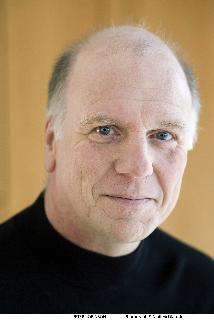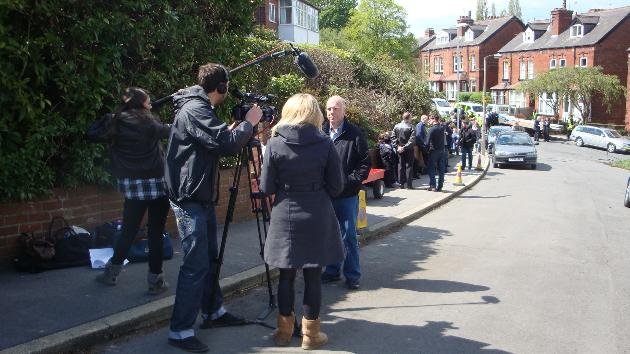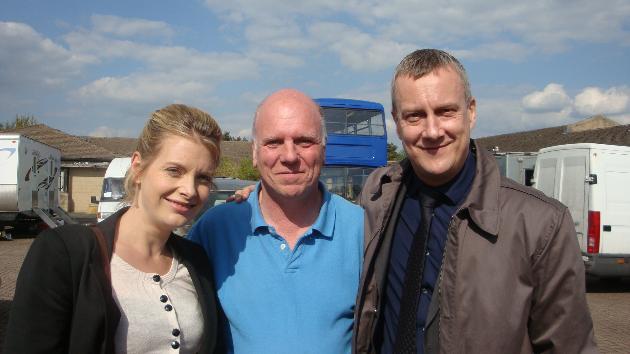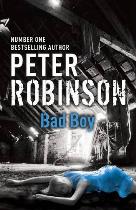|
PETER
ROBINSON on The
award-winning author talks to
Kirstie Long Peter
Robinson is the best selling
writer of the Inspector Banks novels, which have been made into an ITV
series
starring Stephen Tomkinson premiering in September 2010. Peter has been
praised
for his intricate and realistic plots as well as the empathy in his
characters
that jumps off the pages. Bad Boy
is
the nineteenth book in the series and welcomes Alan Banks back to work
after a
necessary period of rest. _____________________________________________________________________
Hi, Peter. To start, for
those who do not know you yet, please tell us about yourself. That’s
a very broad question! Let’s just say that
I grew up in I
didn’t get the crime fiction bug until I was
well into my PhD in the early eighties, and my first Banks novel, Gallows View, was published in 1987. By
then I was living in Congratulations on having
the Alan Banks books picked up for TV. Stephen Tompkinson is playing
the lead –
how does that work for you? It works
fine. When Stephen first heard he was
going to play the role, he got in touch with me and visited me in Anyway,
we got on well together and I was
impressed with his professionalism. I thought he was a bit too tall for
my
vision of Banks, but knew he was a good enough actor to play short. He
doesn’t
need to, though. There’s no way you’ll ever get an
actor who fits everyone’s
picture of a fictional character, so you might as well not worry about
the
physical aspect and concentrate on the essence. Stephen’s
Banks is perhaps a
bit more intense, angry, haunted and guilt-ridden than mine is, but it
all
works wonderfully. This is television, after all, without the benefit
of those
inner monologues you get in novels. The drama is heightened, and we
follow a
man going through a terrible journey from a sense of failure to success
of a
kind, with a lot of bumps in the road. Stephen depicts that journey
with great
skill and economy, often suggesting far more than he shows. By the
way, the rest of the cast is terrific, too,
especially Andrea Lowe as Annie and Lorraine Burroughs as Winsome.
Charlotte
Riley is scary as Lucy Payne, conveying her creepy and manipulative
vulnerability perfectly. I know you went to some
of the filming and had a walk-on part (as did your wife). Could you
tell us
more about that and how it felt? At first
I had vowed to have nothing to do with
TV. After all, I’d been ignored for long enough and seen
enough of my colleagues
ill-served by the medium to know that the most sensible course of
action was to
turn away. On the other hand, I have always been interested in it, so
it seemed
foolish to look a gift horse in the mouth. Why not take the bull by the
horns
(I love mixed metaphors) and make hay while the sun shines? I decided
to be a visitor. I had no input. I
didn’t comment on the script, which I had read and liked, the
casting, the
locations, the music. I left it all to the pros. But I hung about the
set, and,
yes, my wife and I were given walk-on parts. You’ll have to
be quick to spot
us, though! Anyway, it seems they don’t mind writers who
don’t interfere
hanging about, so I spent quite a bit of time at various locations in
It must be difficult to
see your work being translated - probably not as you saw it - and
adapted for
TV; meaning changes to the story to make it work in most cases. How did
you
feel about that? I think I
learned a lot about how the different
media work. People often come up to me and tell me my books are so
visual that
they would need hardly any changes at all to be turned into movies. But
that
doesn’t allow for the rules and conventions of film and
television drama, and
the basic differences between a visual and a literary medium. TV always
transforms its source material. It has to, to make it work. Certain
things need
to be signalled much more clearly, or heightened, on television, where
you
don’t always have the luxury of all those ambiguities and
subtleties of
character and motive you have in a novel. Words are not the primary
medium of film
and television – the longer you can get away without anyone
having to say
anything, the better – but novels are made of words. On the
other hand, it may
take five or six pages of prose to achieve what can be done with a
split-second
shot on TV. So the adaptor taketh away and the adaptor giveth. Also,
it’s only
an adaptation of one book, and you can’t cover every aspect
of all the major
characters in just one TV drama. It would be nice to see it go to
series and
watch the ensemble cast develop and the individual characters reveal
more of
themselves. You’ve said that you are
happy that it will make great TV – are you looking forward to
fan reactions? I
would imagine you’ll also pick up a lot of new readers. Fans
sometimes expect far more exact duplication
in these adaptations than writers do, so I would expect a mixed
reaction. Banks
is too tall, Annie is a blonde instead of a brunette,
Winsome’s too short, that
sort of thing. Minor details. No doubt I’ll get plenty of
comments. And some of
the changes to the original will annoy a few people, too.
It’s also a very
violent story, and the producers haven’t shied away from that
aspect, so I’ll
also no doubt get a few tut-tuts from those fans who are given to
tut-tutting! I’m
always happy to pick up a few more readers. If
nothing else, at least a few more people will have heard of me after
this,
whether they become fans or not. You were awarded a Doctor
of Letters by I’ve
always had a strong connection with the While I
was at Congratulations on that! Turning
now to the book, you have been writing about Alan Banks for quite a
while and Bad Boy is the
nineteenth. Whilst he
(Banks) has aged, it’s not in the same timeline that
you’ve been writing. How
do you handle ageing him, but not too much to keep him working? The books
usually appear a year apart, but the
cases may only take place a few months, or even weeks, apart, so Banks
doesn’t
age a full year between books. Of course, the books do take place at
pretty
much the time I’m writing them, so some of the music Banks
listens to wasn’t
actually out by then! It may confuse some people, but it
doesn’t confuse me.
There’s real time and there’s fictional time. Banks
is a fictional character,
so he lives in fictional time. He’s had various female
friends and is, in my opinion, slightly vulnerable in that way, against
the
hard shell that he needs to have to be the type of policeman he is. Did
you
intend for that to happen, or was it part of the character development?
None of
it was planned. Banks’ vulnerability
arises naturally and develops over time. But he’s also
resilient and manages to
bounce back. I realised I had given him a very hard time over the past
few
books, so he deserved a holiday at the beginning of Bad
Boy! Has Banks ever surprised
you? Done something you wouldn’t have seen him doing? Yes.
There are scenes in just about every book
where he surprises me. It’s part of the fun of writing about
him. I think that
perhaps when he stops surprising me I’ll know I’ve
come to the end. He surprised
me in the desert in Bad Boy. You successfully manage
to have a supporting cast of characters and keep Annie Cabbot in the
thick of
things without being overshadowed. Do you find it hard to keep all the
individual players in your head? Luckily,
there aren’t that many of them. I can
just about handle Banks, Annie and Winsome, with Superintendent
Gervaise making
the occasional appearance. Some characters have fallen by the wayside
over the
years, too, including Gristhorpe and DS Hatchley, who are still around
but in
far more minor roles. I’ve also killed off a couple of
recurring characters.
Usually, if I feel a character isn’t really going anywhere
after a few books,
he or she either leaves or dies! With regard to Bad Boy
– this book starts with Banks on
a bit of a personal pilgrimage, holidaying in the Yes. And
I also needed him out of the way so that
what should have been a simple family matter could go horribly wrong. I
really
thought when I got to the end of All the
Colours of Darkness that I had unintentionally written the
end of the
series, derailed myself. I had stripped Banks of almost everything, so
the only
alternative, if I wanted to keep him going, was to have him recharge,
and
that’s what happens while he’s away in You have said that Bad
Boy came from reading a newspaper
and seeing an article about parents turning their children in over drug
offences.
This is a hand gun – do you think that would happen and is it
something you
would do? Well, it
has happened. If it was in the Guardian, it must be true, right? I
don’t think it’s something I
could do, no. I think it’s something that parents who have
got to the end of
their tether might do, but what a terrible dilemma to find yourself in.
In the
book, remember, Juliet Doyle is simply asking for her old neighbour and
friend,
Banks, to deal with it quietly, not to arrest her daughter and send her
to prison.
The reason it all goes wrong is that Banks isn’t there and it
goes through
official channels instead. Once you had the initial
idea, what led you into the rest – including the
re-introduction of I thought
I’d been neglecting Yes – not much more of a
better way! He come’s back fresh to be flung straight into
the middle of chaos
– Annie shot and his daughter missing! I hope
you’ve never had a holiday ending
in a similar way! Have you…? Thank
God, no! Poor
Banks. I realise I’ve done it to him again. He renews his
relationship with Through
not paying attention. Banks has focused
more of his attention on Brian, the rock star son, and not realised how
bad his
daughter is feeling about her poor degree and her dead-end job.
She’s mixing
with a rather dodgy crowd, into taking E and coke, binge drinking, and
she’s
losing her bearings. I think Tracy and Banks still have a long way to
go to
make things right between them again. There are a couple of occasions
in the
book where Yes – I can see that. She
was both a child and adult warring to fit as one, I felt. A complete
contrast
to the character of Jaff, who is rather chameleon-like as he veers
between
charisma and violence, not only just due to the drugs. What research
did you do
for him and where did he come from? I’ve
known people like Jaff. Perhaps not quite as
dangerous and messed up, but close. It’s partly the drugs, of
course. They do
skewer your perspective. It’s also partly the glamour, the
aura of money and
power and success. Don’t forget that his mother was a famous
Bollywood star who
died young. I wanted the really bad boy in him to emerge slowly
throughout the
story, so it would be believable through his charm, good looks and
charisma
that a girl like I don’t want to give away
the ending, but admit to being surprised by it, because I
didn’t expect it. I
suppose I thought Banks would take action and disarm Jaff; thereby
saving the
day and not that there would be that additional factor. It was
definitely a
good plot twist and for me came across as realistic. Was it in line
with the research
you did on the armed services? Well, it
was hardly a sanctioned response, by the
book, but I think it was in line with the character. It’s
hard to say much
without spoiling it, as you say, but I found that I liked the balance
of
tension and surprise. Suspense usually works best if you put all your
cards on
the table, but sometimes it’s a good idea to keep an ace up
your sleeve. Will we see that
individual again – I get the impression there’s
some unfinished business there.
Especially concerning Annie? I
wouldn’t rule it out. There’s a lot of
unfinished business, much of it concerning Annie. I tend to leave loose
ends in
many of my books and sometimes they come back to haunt me. That
happened in Friend of the Devil and
The Summer that Never Was. We should
also not forget Phil from Playing With
Fire. He’s out there somewhere, too.
I also hope that Annie
recovers sufficiently and is back beside Banks soon – do you
have enough of the
next story planned to know whether that will be part of it? Am I
allowed any
sneak teasers? I have no
idea yet. Actually,
I’m working on a standalone at the
moment, a psychological suspense novel. Great timing, I know (smiles)
since
with the TV pilot and all, people will be craving more Banks - but
these things
happen. The idea’s been on my mind for a while and I
couldn’t put it off any
longer. I really look forward to
that and new readers have got nineteen books to get through! Now, tell
me, do
you get much chance to read yourself and if so who? I read
mostly when I travel, and at the moment I’m
about halfway through Justin Cronin’s The
Passage. I’m enjoying it. I’m also a
subscriber to the Poetry Society and
they have sent me Seamus Heaney’s new book as their autumn
choice, so I’m
looking forward to getting stuck into that. Hodder have kindly sent me
Stephen
King’s new collection of novellas, Full
Dark, No Stars, and I’ve just downloaded William
Faulkner’s Light in August
on audio, so I have
plenty to be going on with. What were the last two
books you read and what did you think of them? Or last two CDs if more
likely –
would Banks have bought them too? Other
than The
Passage, the last two books I read were Karin
Fossum’s Bad Intentions
and John Wyndham’s first novel (as John Benyon), The Secret People, which I unearthed in
a second-hand bookshop in Gisborne, New Zealand, a couple of weeks ago.
The
Karin Fossum was terrific, as usual, and the John Wyndham was as silly
as you
would expect a young man’s first sci-fi/fantasy novel to be.
It’s no Day of the Triffids
or Midwich Cuckoos, shall we say. It’s
unlikely that Banks would have read either of
them. He’s not a great fan of crime or sci-fi, though he was
reading The Maltese Falcon the last
time we saw
him!
Bearing in mind the Banks
series about to premiere - have you had a chance to see much in the way
of TV
or film this year and if so what has especially grabbed you? I really
enjoyed An Education. I first saw
Carey Mulligan play Sally Sparrow in a
scary Doctor Who episode called
“Blink”, and she impressed me tremendously. She was
great in An Education. The other
film that stands
out in The Secret in Their Eyes, an
intelligent and absorbing Argentinean crime thriller by Juan
José Campanella. I
watch most of my TV on DVD as I never seem to be in one place long
enough to
watch a series, and I’m a fan of Mad
Men,
House and Spooks.
in particular, I’ve also been re-watching some old costume
dramas, such as The Duchess of Duke
Street and The Pallisers.
And now to be completely
random and bring this to a close - who would you invite to a dinner
party if
you could have anyone, and who would Banks? Me:
William Shakespeare, Bob Dylan, John Mortimer,
Carey Mulligan, Francoise Hardy and Emily Bronte. Banks:
Stephen Tompkinson, Julie Christie, Miles
Davis, Graham Greene, Thank you,
Peter!
And as we go to
press it was announced that Peter has been awarded the $10,000 Harboufront Festival
Prize. He was chosen by a
jury which included John van Driel, the VP of Programming and
Operations for
Classical 96.3 FM, Geoffrey Taylor, director of the International
Festival of
Authors, and some journalist named Mark Medley. “I am honoured to be awarded the 2010
Harbourfront Festival Prize. Having
looked at the list of previous recipients, I believe it is a privilege
to be in
such august company and I find it incredibly encouraging that the
committee has
chosen to recognize crime fiction in this way,” Robinson said
in a statement. Past winners of the annual prize, which was
established in 1984, include
Wayson Choy, Paul Quarrington, and Guy Vanderhaege. Helen Humphreys was
awarded
the prize last year. Robinson will receive the prize on the final night
of IFOA, October 30. |




